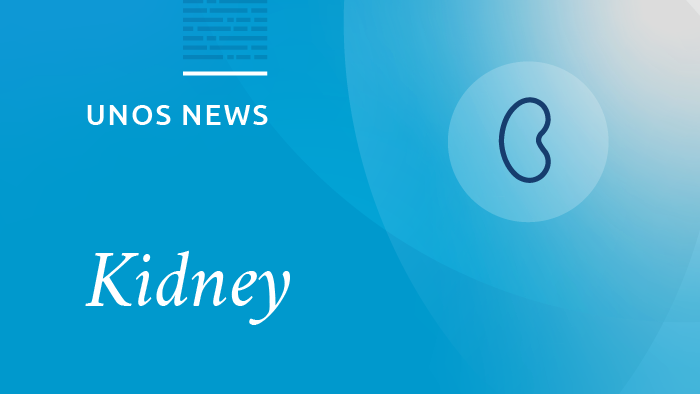On July 18, as part of the response to the Executive Order on Advancing American Kidney Health, the Organ Procurement and Transplantation Network launched the Kidney Accelerated Placement Project, or KAPP, to assess whether accelerating the placement of extremely hard-to-place kidneys via the United Network for Organ Sharing Organ Center could increase their utilization. The KAPP was developed to improve placement of national kidney offers and was based on feedback from the community.
The project’s accelerated placement of hard-to-place kidneys is being tested on national kidney allocations coordinated by the Organ Center. OPTN policy requires all organ procurement organizations, or OPOs, to transfer kidney matches that reach national allocation to the UNOS Organ Center. The KAPP is an organ placement innovation that does not require a change in OPTN policy. It affects only those hard-to-place kidneys that the Organ Center already offers as part of the national allocation process.
The project’s goal is to transplant more hard-to-place kidneys during the national allocation phase by having the Organ Center offer them to centers with an established history of transplanting them.
A safety and monitoring council is monitoring data regularly to determine if this project results in more effective placement of these organs.
Q: What is the Kidney Accelerated Placement Project?
A: A pilot project testing a process for increasing utilization of a subset of hard-to-place kidneys. This project allows difficult-to-place kidneys to reach patients at hospitals that have previously accepted and transplanted medically similar kidneys earlier, potentially minimizing the accumulation of cold ischemic time. The offer can then be extended to other hospitals on the match if not accepted. Qualifying acceptance patterns are updated monthly.
Q: When did the KAPP begin?
A: The KAPP launched July 18, 2019 and lasts for one year. A safety and monitoring council is developing stopping criteria that will trigger an early end to the project if expected outcomes on national kidney offer acceptance are unmet.
Q: I am at a transplant hospital. What does kidney accelerated placement mean for me?
A: You do not need to change any practices. Your hospital will continue to get national kidney offers, and you will continue to accept or decline them.
Q: I am at an OPO. What does kidney accelerated placement mean for me?
A: You do not need to change any practices. OPTN policy already requires OPOs to turn over organ allocation to the Organ Center when a kidney gets to the national level for placement.
Q: What kind of oversight does this pilot have?
A: This time-limited project has oversight by a safety and monitoring council comprised of physicians and OPO executives. They monitor outcomes and discards in real time, evaluate the pilot structure, meet quarterly to discuss progress and identify stopping criteria for the pilot. The council is also tasked with creating recommendations at the end of the pilot for the OPTN Board of Directors to consider.
*Q: What are “hard-to-place” kidneys?
“Hard-to-place” kidneys that qualify for accelerated placement are national kidney offers made by the Organ Center on kidney matches for adult donors with a kidney donor profile index, or KDPI, of 80 or higher. Kidneys from these donors will have been previously offered for any “mandatory” shares (0-ABDR mismatches and highly sensitized candidates at the top of the match run) and offered to all transplant programs at both the local and regional level before being accelerated.
*Q: How does my program qualify for accelerated placement offers?
All national kidney transplant programs will still be eligible to receive all national offers, but the goal of the project is to accelerate the offers of hard-to-place kidneys first to the programs with an established history of transplanting them. There is not a static “accelerated placement” transplant program designation. Accelerated placement transplant programs are determined independently for each donor at the time of allocation. If a transplant program has transplanted a kidney with similar or more marginal donor characteristics in the past, the program will receive accelerated placement offers for that particular match if the kidney reaches the national level and qualifies as hard to place.
*Q: What criteria will be used to determine if a program accepts hard-to-place kidneys?
For determining a transplant program’s history of transplanting a kidney with similar or riskier donor characteristics, all deceased donor transplants (including local transplants) from the prior two years are included. The two-year history will be refreshed monthly to account for any changes in kidney transplant characteristics over time. The donor characteristics that are used to determine accelerated placement transplant programs are transplants from donors with similar or riskier donor KDPI, age, peak serum creatinine, history of diabetes, history of IV drug use, and donation after circulatory death status.
Contact us
Donation and transplant professionals who have questions about the Kidney Accelerated Placement Project, please contact the OPTN at [email protected].
For other questions, please refer to the UNOS contact page.
*added July 25, 2019
Originally published July 17, 2019.

